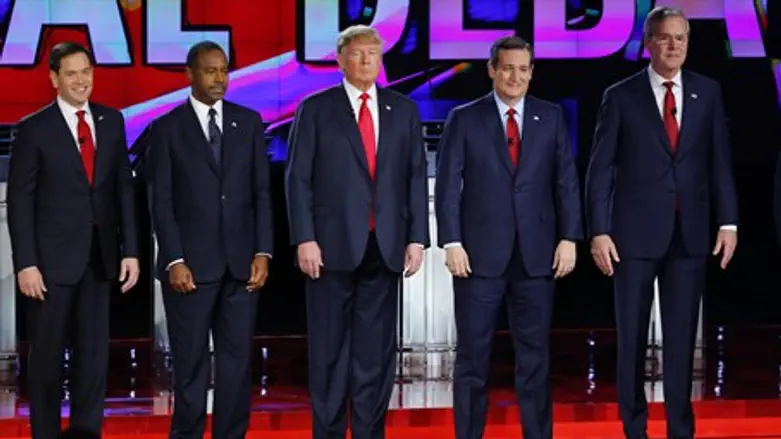
Security in the United States in the wake of the threat from the Islamic State (ISIS) and the recent massacre in San Bernardino was the main topic at the 2016 presidential debate in Las Vegas on Tuesday night.
Arutz Sheva brings you some highlights from the first hour of the debate.
Nine Republican candidates took part in the debate: Donald Trump, Ben Carson, Senator Marco Rubio (FL), former Florida governor Jeb Bush, former tech executive Carly Fiorina, Senator Ted Cruz (TX), Ohio governor John Kasich, New Jersey governor Chris Christie, and Senator Rand Paul (KY).
But it was Trump who took center stage right away, taking credit in his opening statement for having an important contribution in shaping the conversation in politics.
Trump was also the victim of an attack by Bush, who called the billionaire “unhinged” over his proposal to temporarily ban Muslims from entering the country, a proposal which Bush said was not "serious."
“Donald is great at the one liners, but he’s a chaos candidate, and he’d be a chaos president," Bush warned, to which Trump replied, “Jeb doesn’t really believe I’m unhinged", adding Bush was on attack because his campaign has "failed."
"We are not talking about isolation; we are talking about security," Trump said of his proposal. "We are not talking about religion; we are talking about security."
Bush was asked whether the remarks of his brother, former President George W. Bush, about Islam as a religion of peace, are still relevant.
“They are relevant if we want to destroy ISIS... we can’t disassociate ourselves from peace-loving Muslims,” he replied.
Trump also stood by his previous comments that we should shut down parts of the Internet.
“I sure as hell don’t want to let people that want to kill us and kill our nation use our Internet, yessir I am," Trump said in response to a question from debate moderator Wolf Blitzer.
Another interesting confrontation at the debate was between Cruz and Rubio, who were in disagreement on several issues, such as surveillance.
Rubio has been relentless in going after Cruz for his vote for the USA Freedom act, which reformed NSA mass surveillance.
Cruz was strong defending that position when asked about it, saying the bill "strengthened the tools of national security and law enforcement to go after terrorists .. and we are seeing those tools work right now in San Bernardino.”
Rubio countered that losing the phone metadata surveillance program hamstrung the U.S.
Rubio was also asked about his accusations that Cruz voted against the defense authorization act, which is a bill that funds American troops, and replied he has to assume that Cruz would also veto such legislation as president, “and if we continue those cuts, we are going to be left with the oldest and smallest air force we have ever had.”
Cruz replied by explaining he voted against the act because the federal government should not have the authority to detain citizens with no due process.
“ISIS and radical Islamic terrorism will face no greater adversary than me,” he stressed.
Cruz would not answer with "yes" or "no" when asked by Blitzer if his comments about carpet bombing ISIS until the sand glows includes their stronghold in Raqqa, where there are civilians.
Cruz said he would bomb them where they -- and their troops -- are.